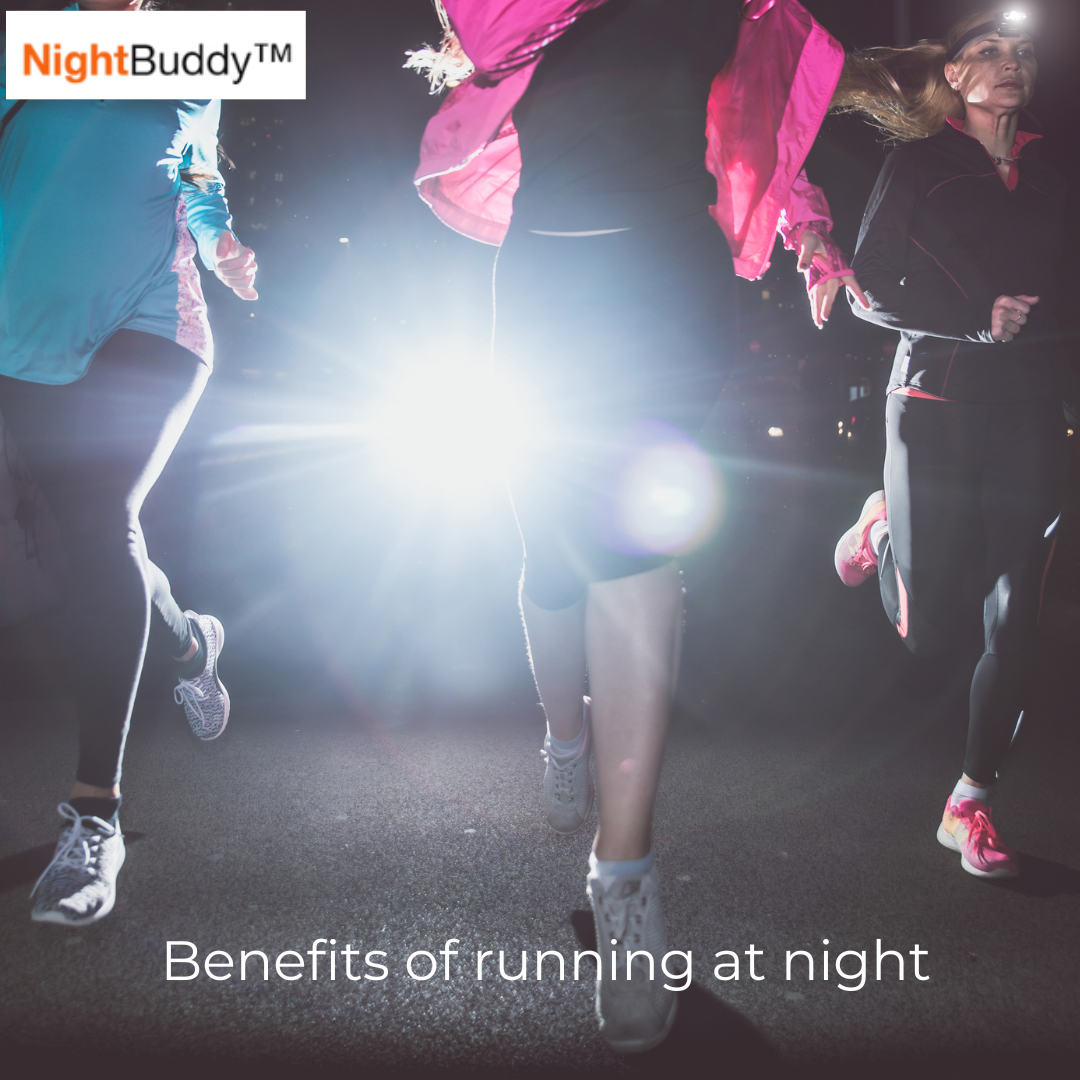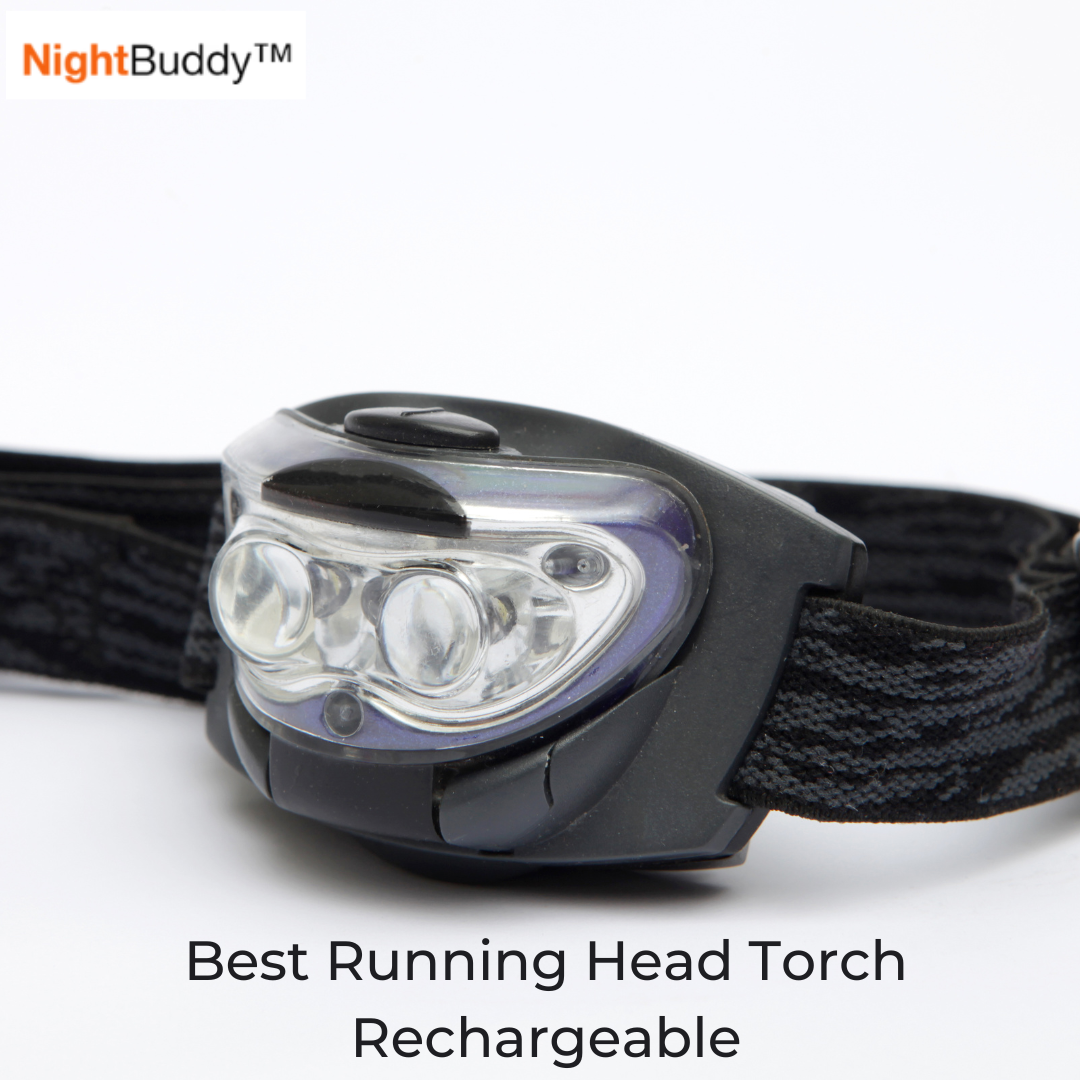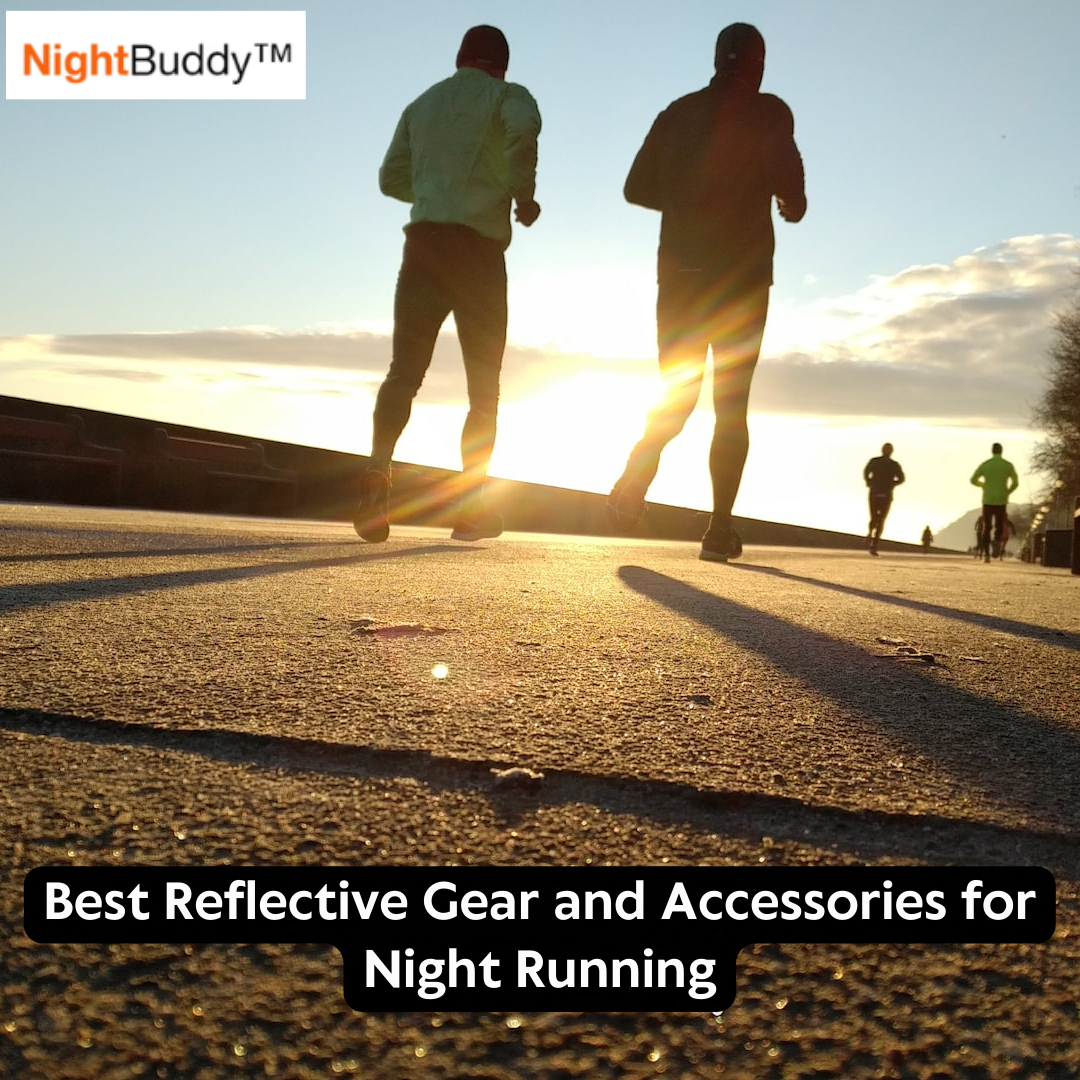There's many benefits in 2023 for running at night;
- Weight loss
- Overall health
- Improved stress levels
- Muscle toning
- And more...
Many people who want to of course, improve their physical and emotional health now enjoy running at night.
Running in the dark may be safe and pleasant with the correct equipment and planning.
Nightbuddy has created this post that will discuss the advantages of nighttime running and offer advice on how to get started.
10 Top Health Benefits of Running at Night

Science shows running at night has several health benefits that are often overlooked. Firstly, running in the dark can help improve sleep quality. Exercise in general has been shown to promote better sleep, and running at night can help you wind down before bed and fall asleep faster.
It's also key to rememeber!
Going for a run at night provides a chance to switch up your routine, elevating your mood and minimizing stress.
Another benefit of running at night is that it can help regulate your circadian rhythm. Our bodies are naturally programmed to follow a 24-hour cycle, with physical activity during the day and rest at night. Running at night can help reset this cycle, making it easier for you to fall asleep and stay awake during the day.
Finally, running at night can also provide a mental challenge. Running in the dark requires you to be more aware of your surroundings and can help increase your confidence and mental toughness.
#1 You'll be able to run more consistently
Many people who want to enhance their physical and emotional health now enjoy running at night.
Why?
Running in the dark may be safe and pleasant with the correct equipment and planning.
#2 You will de-stress after a long day at the office
Simply said, running at night improves your mood. Regardless of how awful your day was, it is finally over, and your reward is running.
So go run in the dark to burn off some tension and release some feel-good endorphins.
#3 Running at night can help you sleep better
After a satisfying run, there are few things that feel better than getting into bed.
Are you concerned that the endorphins will keep you awake?
In a study conducted, it was shown that people may fall asleep deeply and peacefully within 30 minutes of engaging in moderate to vigorous activity for one to two hours.
Also, night hiking will help you sleep better!
#4 Eating during the day and digestion
Running at night gives you plenty of time to eat and digest your meal.
This is perfect for those who don't want to exercise in the morning on an empty stomach yet find it difficult to run straight after eating.
#5 Faster Running
As surprising as it may sound, people run best in the evening hours. Past scientific research revealed that around 8 pm is the time for peak running performance.
The study suggested that early risers performed best just after midday, while late risers peaked at 8 pm. It was found that the worst performance for both groups was at 7 am.
Also, you might feel faster running at night. Your perception of speed is related to the proximity of objects in your surroundings. During the day, distant fields approach slowly. However, during nighttime, when you see over a short distance, fences race past.
#6 More Effective Vision
As mentioned earlier, your vision is compromised at night. Therefore, you have to rely more on your lower-level proprioceptive skills.
Your body is thus able to enter a reflexive and automatic state that has acute senses and reflexes making it effective. Because you aren't depending on your vision, you won't try to control every movement consciously, so your runs will be more effective.
#7 A Form of Meditation and Relaxtion
Completely shut out the noise on the street and Zen out to the sound of your heart beating and feet hitting the ground. Evening runs offer you a quiet headspace to meditate and return home feeling calmer and relaxed.
#8 More Social For Friends
Making friends is hard, but making plans with friends at 5 am is even harder (it's also harder to run at night). Scheduling your workouts at night increases your chances of running into your friends and catching up.
When you combine your workout routine and social life, you get fantastic accountability partners and a reason to always be eager for your forthcoming runs.
#9 No More Stressful Mornings
This is how challenging a morning run can be: you must win the war against the snooze button, work out, have a bath or shower, cook and eat breakfast and prep for the day. You can imagine all the rush to shower and not miss the bus.
The hurry and confusion can also make you exercise for a lesser time as you may fear running late.
You can see how much trouble an evening run saves you, as you won't have to deal with the limitation of daylight hours.
#10 Training With Fewer Injuries
Your core body temperature peaks between 4 pm and 7 pm, making these times the best to schedule your run.
A higher core temperature indicates the following:
- Your joints are well-lubricated
- Your muscles have more oxygen and nutrition
- Your blood flow has increased
- Optimum energy stores
These changes in your body enable you to run faster, safer and with little effort. Studies reveal that a group of marathon runners completed a 10-km trail a minute faster at night than daytime. In addition, moving around all day fuels and warms up your body, making the evening run even easier.
Other benefits of running at night include cooler temperatures and treating yourself to a late-night snack.
How to Get Started with Night Running training?
To get started night running, firstly, make sure you have the right gear. Reflective clothing, headlamps, and hand-held flashlights can help increase your visibility and make you safer on the roads.
You should also consider investing in a good pair of running shoes to ensure comfort and stability while you run.
Next, it's important to plan your route carefully. Make sure you choose a well-lit and safe path, and consider running with a partner or in a group for added safety. If you're running alone, let someone know your route and expected arrival time.
When you're ready to run, make sure you warm up properly. A good warm-up will help prevent injury and get your body ready for the workout ahead. Start with a slow pace and gradually increase your speed as you get into your stride.
Make sure to check out morning vs night running!
What do you need for a night running workout?
When running at night, it is important to have the right accessories. Reflective clothing, headtorches for runners, headlamps, and hand-held flashlights are essential for increasing visibility and staying safe on the roads. Additionally, a good pair of running shoes will ensure comfort and stability while you run. It is also important to bring a cell phone in case of emergency. Finally, consider bringing a water bottle or energy!
Other benefits of Night activities
People like to workout at night, and it's no wonder why. Night activities help with energy levels, to deal with stress, and to help regulate body temperature.
Of course, regular night running can benefit your strength training overtime.
Tips for night running
Here are some Night Buddy tips for night running:
-
Wear reflective clothing: Make sure you wear reflective clothing or accessories to ensure you are visible to drivers and other runners. This can include vests, jackets, or armbands with reflective strips.
-
Use a Night Buddy headlamp or flashlight: A headlamp or flashlight is essential for night running. It will help you see where you're going and avoid obstacles on the trail. Make sure you choose a headlamp or flashlight that is bright enough for your needs and has a long battery life.
-
Stick to well-lit areas: If possible, stick to well-lit areas that are familiar to you. Avoid unlit areas or trails that may be dangerous at night.
-
Run with a buddy: Running with a buddy or a group can be safer than running alone at night. It can also be more fun and motivating.
-
Be aware of your surroundings: Pay attention to your surroundings and be aware of any potential hazards. This can include uneven pavement, low-hanging branches, or other runners or cyclists.
-
Carry identification and a phone: Make sure you carry identification and a phone with you in case of an emergency. This can help ensure you get the help you need quickly.
-
Adjust your pace: Running at night can be more challenging than running during the day. Adjust your pace accordingly and don't push yourself too hard.
Does running at night help you sleep?
Yes, running at night can help you sleep better. Studies show exercise and decrease insomnia, which leads to overall better sleep at night.
Last Thoughts From The Night Buddy Team
Running at night can be a great way to improve your physical and mental health, and with the right preparation, it can be a safe and enjoyable experience. So, why not give it a try tonight? You may be surprised at how much you enjoy it! Don't forget to check out more guides from the Nightbuddy team;
For more information on night running, check out these sources:
- Runner's World: 10 Tips for Running Safely at Night
- Verywell Fit: How to Stay Safe While Running at Night
- Women's Running: Night Running Safety Tips
Frequently Asked Questions
Can I run before I go to sleep?
Some runners may find it helpful to run before night since it relieves tension and worry that may otherwise keep them awake.
In the end, each runner must determine what suits their schedule and lifestyle the best. Trying out various running times might help you determine what is most effective for you.
Can you run in the morning?
For the obvious reasons, not many individuals choose to run in the morning. However, many who favour early runs claim that it provides them mental space since there is less noise and traffic on the roads, and the run is more pleasant because the sun isn't as intense. Here are several benefits of running in the morning.
Make sure to check out the best trial running headlamps.
More useful guides:





Leave a comment
This site is protected by hCaptcha and the hCaptcha Privacy Policy and Terms of Service apply.